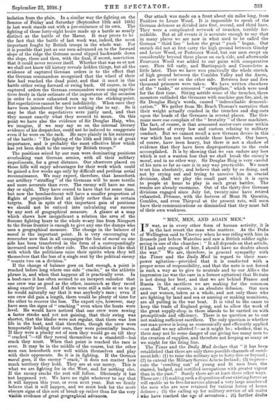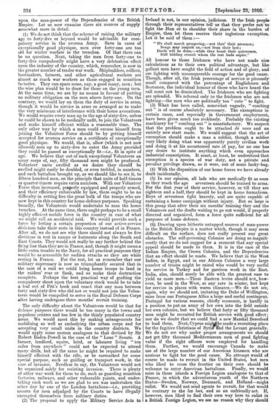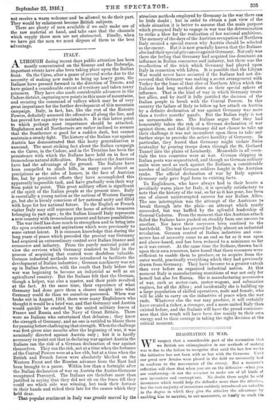" MEN, MEN, AND AGAIN MEN."
Iwar, as in every other form of human activity, it is 1 in the last resort the man who matters. As the Duke of Wellington said to Creeve y when he was riding with him in Brussels just before Waterloo and saw a British soldier sight- seeing in one of the churches : " It all depends on that article. If I had only enough of him, I should have no doubts about the war." We are, therefore, in general sympathy with the Times and the Daily Mail in regard to their man- power agitation—provided that it is conducted with a proper sense of responsibility, and that the note is not forced in such a way as to give to neutrals and to our Allies the impression (as was the case in a former agitation) that Britain is not doing her best, and that we are behind France and Russia in the sacrifices we are making for the comm on cause. That, of course, is an absolute delusion. Our men and our women, taken as a whole, and not only those who are fighting by land and sea or nursing or making munitions, are all pulling in the war boat. It is vital to the cause to keep the trade of England going, and to allow the work of the great supply-shop in these islands to be carried on with promptitude and efficiency. There is no question as to our not making sufficient sacrifices. The only question is whether our man-power is being as economically and efficiently applied —or shall we say allotted ?—as it might be ; whether, that is, there may not be some danger of our giving too many men to the creation of supplies, and therefore not keeping as many as we might for the firing line. The Times and the Daily Mail declare that " it has been established that there are only three possible channels of enrol- ment left : (1) to raise the military age to forty-five or beyond ; (2) to extend the Military Service Acts to Ireland ; (3) to prose cute the `combing out' of young and fit men from the starred, badged, and certified occupations with greater vigour than in the past." Surely there are at least three other ways. These are : ( I) making such a disposition of our existing forces as will enable us to free for service abroad a very large number of the men who are now retained for various forms of home defence ; (5) the calling up for military service of all males who have reached the age of seventeen ; (6) further drafts upon the man-power of the Dependencies of the British Empire. Let us now examine these six sources of supply somewhat more in detail.
(1) We do not think that the scheme of raising the military age to forty-five or beyond would be advisable for com- pulsory service in the oversee Army. Save in cases of exceptionally good physique, men over forty-one are too old for winter warfare in the trenches. Of that there can be no question. Next, taking the men from forty-one to forty-five compulsorily might have a very deleterious effect upon the industry of the country, which, remember, is now in the greater number of trades war work. Shipbuilders, colliers, bootmakers, farmers, and other agricultural workers are almost as much war workers as those engaged in munition factories. They can spare some, nay, a good many, men ; but the wise plan would be to draw for these on the young men. At the same time, we are by no means in favour of putting no military obligation on the men above forty-one. On the contrary, we would lay on them the duty of service in arms, though it would be service in arms so arranged as to make the very minimum of interference with their home avocations. We would require every man up to the age of sixty-five, unless he could be shown to be medically unfit, to join the Volunteers and make himself efficient within a reasonable time. The only other way by which a man could excuse himself from joining the Volunteer Force should be by getting himself accepted for oversee service on a certificate of exceptionally good physique. We would, that is, allow (which is not now allowed) men up to sixty-five to enter the Army provided they could be passed as exceptionally fit—i.e., fit in spite of age. We believe that out of such exceptional Volunteers an army corps of, say, fifty thousand men might be produced. Volunteer units swelled as we desire they should be swelled might easily be doubled, or even trebled, in numbers, and each battalion brought up, as we should like to see it, to fifteen hundred men, on the principle that units of half-timers or quarter-timers require extra numbers. With our Volunteer Force thus increased, properly equipped and properly armed, and their efficiency enforceable by law, there ought to be no difficulty in setting free the great bulk of the troops who are now kept in this country for home-defence purposes. Speaking broadly, the Volunteers would undertake to man the home trenches. At the same time, there ought perhaps to be a small highly efficient mobile force in the country in case of what we might call an accidental raid. We would provide such a force by letting a certain proportion of our active-service divisions take their rests in this country instead of in France. After all, we do not see why there should not always be five divisions in rest in camps or hutments along the South and East Coasts. They would not really be any further behind the firing line than they are in France, and, though it might mean a little extra trouble to the Navy, for all practical purposes they would be as accessible for sudden attacks as they are while resting in France. For the rest, let us remember that our military supremacy is now so triumphantly secured that in the case of a raid we could bring home troops to land in the raiders' rear or flank, and so make their destruction complete. Perhaps the best practical way of grafting the compulsory shoot upon the voluntary stock would be to take a leaf out of Pitt's book and enact that any man between forty and sixty-five who did not or would not join the Volun- teers would be compelled to serve in the Royal Defence Corps after having undergone three months' recruit training.
The only difficulty about the Volunteers would be that for defence purposes there would be too many- in the towns and populous centres and too few in the thinly populated country areas. We would meet this by making arrangements for mobilizing as well as embodying the urban corps and for accepting very small units in the country districts. We would apply some system analogous to that devised by Sir Robert Baden-Powell in the case of the " Lone " Scouts. A farmer, landlord, squire, laird, or labourer living " ten miles from anywhere " could not be expected to attend many drills, but all the same he might be required to make himself efficient with the rifle, or be earmarked for some special purpose, such as guiding or transport work, in the case of invasion. Needless to say, the Volunteers would not be organized solely for resisting invasion. There is plenty of other war work for them to do, such as guarding munition factories, railways, and other vulnerable points, and under- taking such work as we are glad to see was undertaken the other day by one of the London battalions—i.e., providing escorts for men adjudged by the Courts to have illegally exempted themselves from military duties. (2) The proposal to apply the Military Service Acts to Ireland is not, in our opinion, judicious. If the Irish people through their representatives tell us that they prefer not to fight the Hun or to shoulder their share in the burden of Empire, then let them receive their inglorious exemption. Let it be said of them :- " We shall march prospering,—not thro' their presence; Songs may inspirit us —not from their lyre;
Deeds will be done,—while they boast their quiescence, Still bidding crouch whom the rest bade aspire."
All honour to those Irishmen who have not made thew calculations as to their own political advantage, but like, gallant men have sought the field of action and of glory, and are fighting with unconquerable courage for the good cause. Though, after all, the Irish percentage of service is piteously small compared with the percentage of Englishmen. and Scotsmen, the individual honour of those who have heard the call must not be diminished. The Irishmen who are fighting, are splendid. We referred only to the Irishmen who are not fighting—the men who are politically too " cute " to fight. (3) What has been called, somewhat vaguely, " combing out " is of course absolutely necessary. The exemptions in certain cases, and. especially in Government employment, have been given much too recklessly. Probably the existing machinery for " combing out " is unsatisfactory. We suspect that the problem ought to be attacked de novo and an entirely new start made. We would suggest that the act of exemption should make a man a soldier, though a soldier very likely doing what was apparently purely civilian work and doing it at his accustomed rate of pay, for no one has any desire to institute anything which even approaches industrial conscription,. It must, at least, be understood that exemption is a species of war duty, not a private and peculiar privilege drawn, as it were, out of some lucky-bag.
(4) With the disposition of our home forces we have already dealt incidentally.
(5) In our opinion, all lads who are medically fit as soon. as they reach the age seventeen should be trained to arms. For the first year of their service, however, or till they are• eighteen and a half, they should be kept in home formations. Boys of seventeen fight bravely, and are quite capable of sustaining a- home campaign without injury. But so large is this group that after their six months' training they and the Volunteers and the drafts waiting to go out would, if properly directed and organized, form a force quite sufficient for all purposes of- home defence.
(6). Drawing upon hitherto untapped sources of man-power in the British Empire is a matter which, though it may seem difficult on the surface, does not really present any great obstacles. The self-governing. Colonies are doing so magnifi- cently that we do not suggest for a moment that any special appeal should be made to them. It is in the case of the Indian Empire, the Crown Colonies, and the Dependencies that an effort should be made. We believe that in the West Indies, in Egypt, and in our African Colonies a very large number of troops might be raised who would be very useful for service in Turkey and for garrison work in the East. India, also, should surely be able with the greatest ease to yield us more men.—These Eastern levies should not,, how- ever, be used in the West, at any rate in winter, but kept for service in places with warm climates.—We do not see, again, why we should not, imitating the Duke of Wellington, raise from our Portuguese Allies a large and useful contingent. Portugal for various reasons, chiefly economic, is hardly- in a position to put an army of her own into the field outside her own colonies, but we believe that forty or fifty thousand men might be recruited for British service with good effect ; nor do we doubt that we could find a new Marshal Beresfortt to lead them. Next, Cyprus mig a e made a recruiting place for the fugitive Christians of Syri • .%. d the Levant generally. We do not see why under- proper arrangements we should not get fifty thousand Mediterranean men of good fighting value if the right officers were employed for handling them. Further, we would encourage Canada to make use of the large number of our American kinsmen who are anxious to fight for the good cause. No attempt would of course be made to recruit in the United States, but men who liked to cross the frontier on their own should be welcome to enter American battalions. Finally, we would raise in these islands a Foreign Legion analogous to that of France, in which the adventurous youth of the Northern States—Sweden, Norway, Denmark, and Holland—might enlist. We would not send agents to recruit, for that would be contrary to the lex loci, and so an unfriendly act. If, however, men liked to find their own way here to enlist in a British Foreign Legion, we see no reason- why they should not receive a warm welcome and be allowed to do their part. They would by enlistment become British subjects. There are plenty of men available if we -only make use of the raw material at hand, and take care that the channels which supply those men are not obstructed. Finally, when we have got the men we must dispose of them to the best advantage.




































 Previous page
Previous page